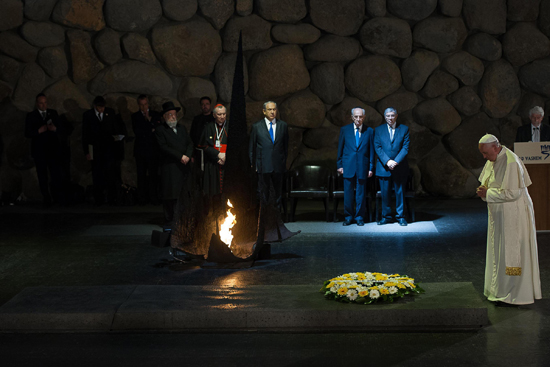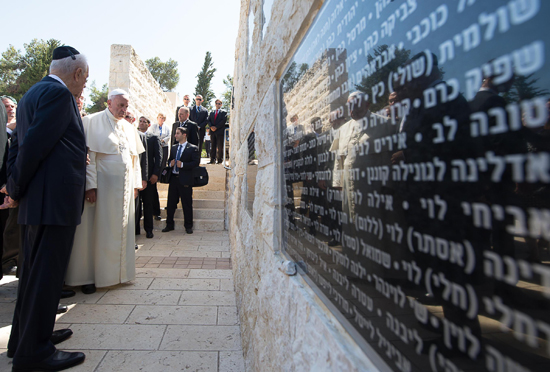Pope Francis made an emotional visit to Israel’s Yad Vashem Holocaust museum today, meeting survivors of what he called a “boundless tragedy” on the final leg of his pilgrimage to the Holy Land.
The Pope drew on the Book of Genesis for his short address at the museum, saying: “In this place, this memorial of the Shoah, we hear God’s question echo once more: ‘Adam, where are you?’…Here we are, Lord, shamed by what man, created in your own image and likeness, was capable of doing. Remember us in your mercy.”

Pope Francis met with six Holocaust survivors at the museum, kissing the hand of each and listening briefly to their stories, his head bowed throughout.
He paused in reflection before and after the address, in which he referred to the Holocaust as a “massive idolatry” and concluded, “Never again, Lord, never again!”
The remarks came after Pope Francis lit the flame of remembrance and laid a wreath at the museum. The Yad Vashem chairman, Avner Shalev, presented him with a reproduction of a painting by a teenaged victim at the Lodz ghetto.
Also present were the former Chief Rabbi Yisrael Meir Lau, himself a Holocaust survivor as well as the Israeli Prime Minister Binyamin Netanyahu, President Shimon Peres, whom Francis embraced.
Francis has pleased the Jewish community by ordering the re-examination of Vatican files relating to the Holocaust.
When Pope Emeritus Benedict XVI visited Yad Vashem in 2009, there was controversy here over his alleged refusal to tour the exhibition because of a notice summarising the argument that Pius XII failed to oppose Hitler’s extermination of the Jews or endorse the 1942 Allied declaration condemning it. The notice said that on the deportation of Jews from Rome to Auschwitz, "the Pope did not intervene". Benedict had called Pius XII as a “great” churchman.
The museum has since amended the notice to include accounts from individuals who said that the Church’s “neutrality” helped save lives.
Pope Francis is viewed by the Jewish community as highly sympathetic, not least thanks to his friendship with Rabbi Abraham Skorka from Buenos Aires, with whom Francis has collaborated in a book.
Yesterday, the Israeli President Shimon Peres and Prime Minister Benjamin Netanyahu praised Pope Francis for taking a stand against anti-Semitism and referred to his friendship with Rabbi Skorka.
The visit to Yad Vashem came after Francis became the first pope to lay a wreath on Mount Herzl, the burial site of the Zionist leader Theodor Herzl whose request for help in establishing a Jewish state was rejected at the Vatican by Pius X in 1904. The gesture was controversial with Palestinian activists condemning it while the Israeli media have described it as a papal “apology.”

At the cemetery Francis then made an unscheduled approach to the monument in memory of victims of terrorism, at the request of the Israeli Prime Minister Benjamin Netanyahu. In a symbolic echo of his gesture at the West Bank security yesterday, he prayed and placed his hand on the black marble plaque. The Israeli Government was alarmed last night when images of Pope Francis's prayer at the security barrier were broadcast around the world and this morning the Pope was persuaded to visit the memorial in the cemetery and make a similar gesture.
Francis further reached out to the Jewish community when he addressed rabbis at Jerusalem’s Great Synagogue, speaking of the progress made in recent decades in relations between Catholics and Jews and referring to the Jewish roots of Christianity.
The Pope said that those of both faiths were called by God to reflect on their spiritual bond and, acknowledging past "difficulties" in the relationship credited what he called a “journey of friendship” to the Second Vatican Council.
“This journey of friendship represents one of the fruits of the Second Vatican Council … I am convinced that the progress which has been made in recent decades in the relationship between Jews and Catholics has been a genuine gift of God,” he said.
Acknowledging “all the difficulties” of the relationship between the Church and Jews in the past, he added: “We need to do more than simply establish reciprocal and respectful relations on a human level: we are also called, as Christians and Jews, to reflect deeply on the spiritual significance of the bond existing between us. It is a bond whose origins are from on high, one which transcends our own plans and projects, and one which remains intact despite all the difficulties which, sadly, have marked our relationship in the past.”
The Pope said that Catholics should reflect on the Jewish roots of their faith and he requested that Jews reflect more on Christianity, which was born in Israel. “On the part of Catholics, there is a clear intention to reflect deeply on the significance of the Jewish roots of our own faith. I trust that, with your help, on the part of Jews too, there will be a continued and even growing interest in knowledge of Christianity, also in this holy land to which Christians trace their origins.”
Earlier this morning, Pope Francis visited the Dome of the Rock, where he met with the Grand Mufti of Jerusalem and all of Palestine, Sheikh Muhammad Ahmad Hussein, and other Muslim leaders.
The Pope urged non-violence in his address at the place where Abraham is believed to have prepared to sacrifice his son Isaac (or Ishmael according to Muslims). “Dear friends, from this holy place I make a heartfelt plea to all people and to all communities who look to Abraham,” he said. "May no one abuse the name of God through violence."
From there he visited the nearby Western Wall, the remaining part of Jerusalem’s original Temple and the world’s holiest site for Jews, where the Pope touched the wall’s stones and emulated millions of Jews by placing a note of prayer inside a crack in the wall. The Pope had written the Lord’s Prayer by hand in Spanish. Francis also read a chapter from the Book of Songs with the Western Wall’s Rabbi, Shmuel Rabinovitch.
Later today, the Pope will meet formally with President Peres at the presidential residence in West Jerusalem, before receiving Prime Minister Netenyahu at the Vatican-owned Notre Dame centre.
He will then return to Christian spiritual events, again meeting with the Patriarch of Constantinople at the Orthodox church of Viri Galileai on the Mount of Olives before descending the Mount to the site of the Garden of Gethsemane, where Jesus prayed in agony on Maundy Thursday.
On Saturday the garden was closed for preparations of the visit but inside, a Franciscan priest, Jacob Dallagassa told The Tablet: “For us this is the crucial moment where we can renew our all important dialogue with other Christians and those of other faiths.”
Finally, the Pope will celebrate Mass this evening at the Cenacle on Mount Zion, the reputed site of the Upper Room and Last Supper. The room is adjacent to King David’s Tomb and has been the scene of protests from Jewish nationalist and Orthodox extremists who fear it will be handed over by Israel to the Vatican. Security has been tightened for the Mass, with several activists barred from entering the Old City. An Israeli policeman outside the Cenacle, who asked not to be named, told The Tablet that “there will be no violence; the trouble-makers have all been dealt with.”
The Pope returns to Rome tonight.
Above: Pope Francis visits the Yad Vashem Holocaust Museum in Jerusalem on 26 May. Photo: CNS photo/ OSSERVATORE ROMANO handout, EPA
Above: Pope Francis visits a memorial at Mount Herzl in Jerusalem. Photo: CNS photo/ OSSERVATORE ROMANO handout, EPA


 Loading ...
Loading ...